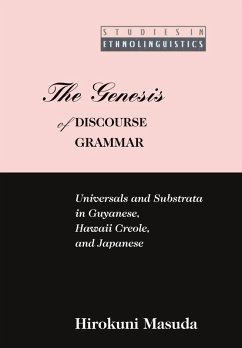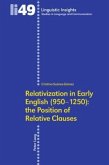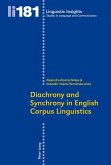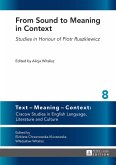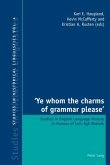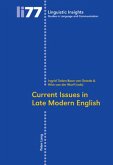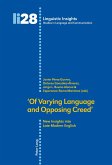Hirokuni Masuda applies the modified Verse Analysis to the study of creole languages seeking evidence to support the two principal theories: universalist and substratist. Hawaii Creole manifests in discourse a universal feature of patterning, which is shared by Guyanese Creole as well as by Chinook Jargon. On the other hand, Hawaii Creole also shows an idiosyncratic phenomenon of numbering, which appears to have been linguistically transferred from Japanese as substratum. Dr. Masuda's research reinforces a hypothesis that both internal innate properties and external substratal factors need to be taken into account to explain the origin of creole discourse grammar.
"Verse Analysis arose out of concern with the organization of oral narratives. By now such constituents, and the recurrent relations among them, have been discovered in more than sixty Native American languages, in many narratives in English, and in a number of other languages, including Chinook Jargon. All these studies have focused on particular texts. Dr. Masuda is the first to connect such relations with historical change, giving a new dimension to the emergence of creole languages. It is to be hoped that others will follow his lead." (Dell Hymes, Department of Anthropology, University of Virginia)
"Dr. Masuda has brought a new perspective to the study of creole origins and his careful work will repay reading by creolists as well as by all those concerned with the analysis of discourse."
(Derek Bickerton, Department of Linguistics, University of Hawaii at Manoa)
"Hirokuni Masuda's book reveals how universals and substratum influence are manifested in creole discourse. Applying Verse Analysis to Hawaii Creole English, Dr. Masuda shows that speakers of Japanese ancestry have maintained certain salient features of narrative structure characteristic of Japanese. While there has been ample evidence for substratum influence on creole syntax, his study provides a striking demonstration of the historical continuity of cultural and linguistic traditions at the very heart of discourse organization."
(Suzanne Romaine, Merton College, Oxford University)
"Dr. Masuda has brought a new perspective to the study of creole origins and his careful work will repay reading by creolists as well as by all those concerned with the analysis of discourse."
(Derek Bickerton, Department of Linguistics, University of Hawaii at Manoa)
"Hirokuni Masuda's book reveals how universals and substratum influence are manifested in creole discourse. Applying Verse Analysis to Hawaii Creole English, Dr. Masuda shows that speakers of Japanese ancestry have maintained certain salient features of narrative structure characteristic of Japanese. While there has been ample evidence for substratum influence on creole syntax, his study provides a striking demonstration of the historical continuity of cultural and linguistic traditions at the very heart of discourse organization."
(Suzanne Romaine, Merton College, Oxford University)

